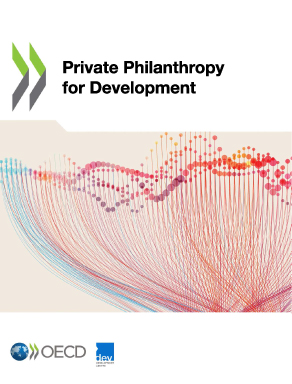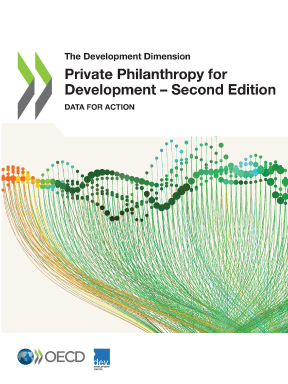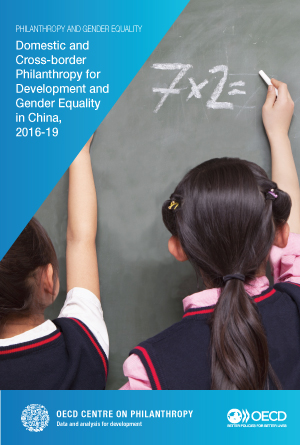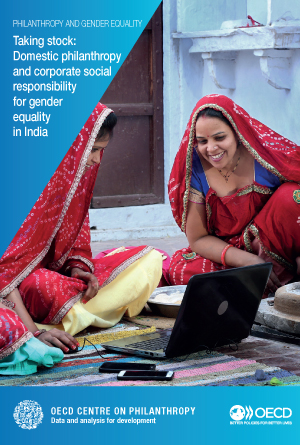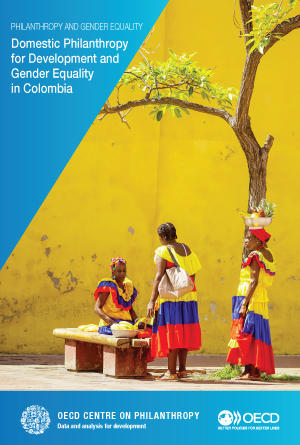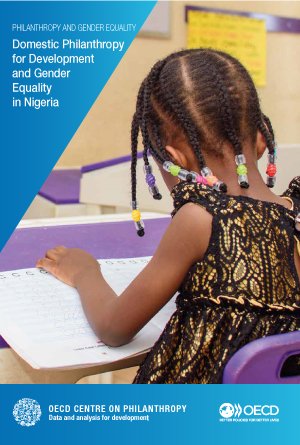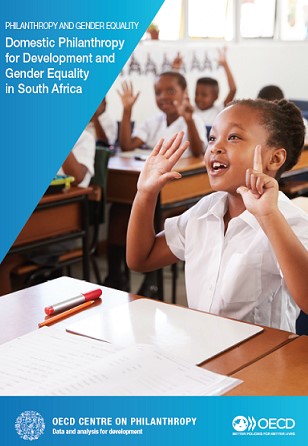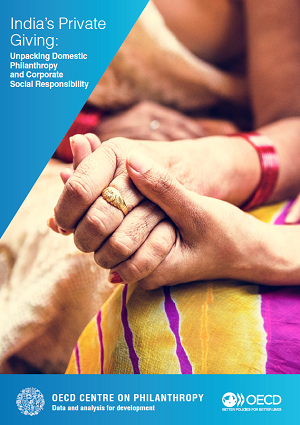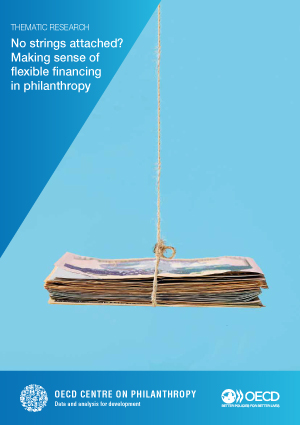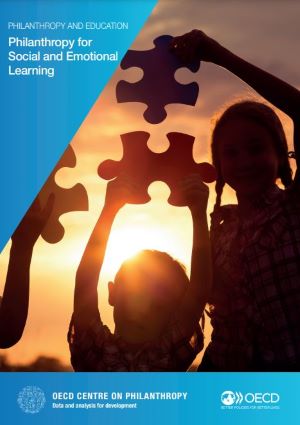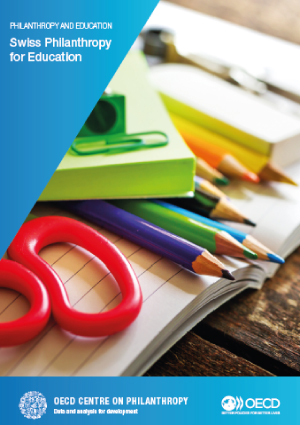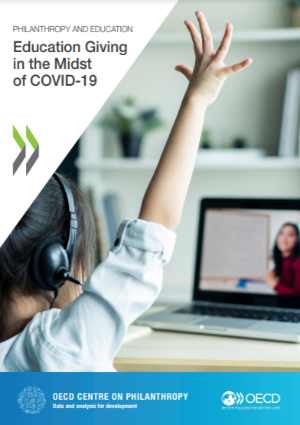Global trends
Private Philanthropy for Development
Providing open, free, comparable and reliable data on philanthropy is at the heart of the OECD’s contribution to the 2030 Agenda.
For further information on our research and survey please contact philanthropy@oecd.org.
First Edition - Private Philanthropy for Development
Over 140 foundations participated in the first edition of the survey Private Philanthropy for Development. This resulted in the launch of an open database, with grants and projects representing USD 24 billion of funding between 2013 and 2015, and a flagship report Private Philanthropy for Development. This report calls into question long-held assumptions about the volume, nature and potential of foundations’ engagement in developing countries, and the role they can play to support the SDGs. It presents ground-breaking data and analysis that capture previously non-existent global and comparable quantitative and qualitative data on how foundations support development. The report examines philanthropic resource flows for development purposes, as well as foundations’ priorities, practices and partnering behaviours. It presents fresh perspectives and action-oriented recommendations to optimise philanthropy’s role in support of sustainable development. This report offers practical insights for government policy makers and decision makers in civil society organisations, social enterprises and foundations. It results from close co-operation between the OECD Development Centre’s Network of Foundations Working for Development (netFWD) and the OECD Development Co-operation Directorate.
- Read the full report (.pdf)
- Read the press release
- Access the Interactive data visualisation tool*
- Download the dataset (.xls)*
* Provided by OECD Development Co-operation Directorate
Second Edition - Private Philanthropy for Development
Data for Action
This second edition of Private Philanthropy for Development aims to meet the growing demand for open, reliable and comparable data on philanthropic giving. Compared to the first edition, it collected more data from large foundations and other organisations based in developing countries to have a more comprehensive understanding of cross-border financing and domestic giving. The report analyses philanthropic flows by geography, sector and thematic area, explores how these flows are implemented and compares their scope to official development assistance (ODA). It dives deeper into foundations’ strategies for mobilising additional resources through their assets and philanthropic capital; looks at their engagement in advocacy to amplify and sustain their impact; and studies their approaches to learning and knowledge production through monitoring and evaluation. The report unpacks unprecedented data on philanthropy’s contribution to developing countries, which will be critical for development actors, including governments, ODA providers and foundations, to better co-ordinate their actions, exploit synergies and play to their best comparative advantage en route to a sustainable recovery.
Country studies
Domestic philanthropy in emerging countries
Philanthropy for development is rising in emerging markets, and reliable information will help understand its scope, scale and effectiveness. The OECD Centre on Philanthropy is carrying out primary research on what foundations are contributing to in 5 emerging economies: China, Colombia, India, Nigeria and South Africa.
Domestic and Cross-border Philanthropy for Development and Gender Equality in China, 2016-19
New research on philanthropy in China compares what the largest 62 domestic philanthropic foundations in China, and the largest 45 cross-border foundations active in China, are contributing to development in the country.
Domestic philanthropy in China has significantly outpaced philanthropic funding coming from foundations based in other countries, but like other emerging markets, domestic philanthropy is highly concentrated within the country in just a few regions.
The report further discusses the diverging sectoral focuses of domestic and cross-border philanthropy in China, and makes recommendations for geographic transparency, diversification of sectoral allocation, increased focus on gender equality, and partnerships between domestic and international organisations.
Taking stock: Domestic Philanthropy and Corporate Social Responsibility for Gender Equality in India
Philanthropy, both domestic and international, and corporate social responsibility (CSR) are supporting gender equality in India. In recent years, the introduction of the 2013 Companies Act, which mandates and regulates CSR, has substantially increased resources towards development projects in the country. Using data from 183 organisations, this study charts the sectoral and geographical allocation of philanthropic and CSR giving in India for 2016-19, and estimates financing that aims to tackle gender inequalities. The report finds that philanthropy towards gender equality continues to be limited and dispersed within India, and in some areas, such as support to women’s organisations, is not allocated towards states with the highest needs.
The findings and recommendations in the report will help CSR and foundations ensure a needs-based sectoral and geographical allocation of their resources, and provides suggestions on how the Indian government can improve the tracking of CSR and philanthropic support for gender equality.
Domestic Philanthropy for Development and Gender Equality in Colombia
The OECD, in partnership with the Asociación de Fundaciones Empresariales y Familiares de Colombia (AFE) conducted a survey of 54 of the largest private philanthropic organisations’ in Colombia to chart their domestic philanthropic giving towards development.
The findings and recommendations in the report will enable Colombian philanthropic organisations to better align their objectives, by learning from each other’s experiences and scaling-up program collaboration. The report specifically explores the allocation of resources within different thematic areas and regions within the country, describes the collaborative network of co-financing between domestic foundations, and provides an in-depth focus on how Colombian philanthropic giving supports gender equality.
An open-access dashboard is available to help navigate the dataset. The dashboard helps users explore the dataset interactively, as well as customize and download data tables and figures for additional analysis.
- Read the full report (.pdf) - English version
- En español - Filantropía doméstica para el desarrollo y la igualdad de género en Colombia - Leer el informe completo (.pdf)
- Open-access dashboard for exploring and downloading the data
- Download the entire dataset (.xlsx)
Domestic Philanthropy for Development and Gender Equality in Nigeria
Nigeria is one of the largest recipients of international philanthropic funding, but little is known about its domestic philanthropy.
This report offers an insight into the philanthropy of a group of 12 domestic foundations in Nigeria for 2013-18, comparing it with other sources of development finance, like cross-border philanthropy and official development assistance (ODA) towards Nigeria.
The report also shows how domestic and cross-border philanthropy advance the country's gender equality agenda. Although Nigeria has made significant progress on gender equality, it still lags when compared with other countries in various dimensions, with persistent gender gaps in educational attainment, economic empowerment, political voice and individual agency.
Ultimately, the report makes recommendations on how to improve the transparency of the Nigerian philanthropic sector.
Domestic Philanthropy for Development and Gender Equality in South Africa
South Africa is one of the largest recipients of financing from international foundations, but little is known about domestic philanthropy. The OECD, in partnership with the Independent Philanthropy Association of South Africa (IPASA), surveyed some of the largest organisations in South Africa to chart how philanthropic resources are helping advance the country's development agenda. The report describes the results from a survey of 31 organisations, covering their projects and grants between 2013-18, exploring the allocation of resources in different thematic areas and geographies, and providing an in-depth focus on how domestic philanthropy supports gender equality. This will enable domestic philanthropic organisations to better align their priorities, learn from each other’s experiences, and explore scaling-up their programs partnerships.
An open-access dashboard is available to help navigate the dataset. While the report presents summary statistics and figures on an aggregated level, the dashboard helps users explore the dataset interactively, as well as customize and download data tables and figures for additional analysis.
- Read the full report (.pdf)
- Open-access dashboard for exploring and downloading the data
- Download the entire dataset (.xlsx)
India's Private Giving: Unpacking Domestic Philanthropy and Corporate Social Responsibility
India is the largest recipient of financing from international foundations (OECD, 2018), yet little is known about domestic philanthropy. The OECD has compiled information from some of the largest organisations in India to start charting how these resources are advancing the country's development agenda.
The report describes the results from a survey of 50 organisations, showing how domestic philanthropy surpasses international philanthropy in scope and scale, and how it allocates it’s resources in different areas and geographies in India, drawing comparisons with other key sources of finance like Official Development Assistance and public social spending. This information will enable foundations and companies alike to align their work better, in order to achieve a higher impact by scaling-up their programs and grants through networks of partnerships. The report and latest data on philanthropy and CSR in India are both freely available.
Thematic studies
Thematic studies
Philanthropy is at the forefront of financing innovative approaches to social challenges. The OECD Centre on Philanthropy is conducting reviews of initiatives financed by philanthropy in multiple areas to find best practices and lessons that other donors, governments and the private sector can put in practice.
No strings attached? Making sense of flexible financing in philanthropy
When, why and to which grantees do private donors provide flexible general support grants?
Are philanthropic donors shifting from giving earmarked support for specific projects to providing unrestricted general support grants? This paper critically looks at philanthropic financing to establish which donors are making the shift, which are not, and what explains the differences.
Based on the OECD database on Private Philanthropy for Development 2016-19, with over 180 private philanthropic donors from 32 countries, and historical yearly giving from 20 large international foundations between 1982 and 2022, the paper estimates the likelihood of flexible giving according to grantee characteristics such as geographical location, sector of operation and the type of organisation receiving the funding through a Bayesian statistical analysis.
Flexible financing is found to represent around 16% of all philanthropic donations, or 19% of all funding between 2016 and 2019. More recently, a few large US-based foundations have shifted towards more flexible giving, but most continue to operate through earmarked funding. There is large variability across time and philanthropic donors, ranging from those that do not provide any flexible financing to those that devote most of their funding to general support.
Philanthropy for Social and Emotional Learning
Philanthropy supports a wide range of programmes globally that aim to give students skills beyond academic performance.
This report details the findings of a global survey on philanthropy-funded initiatives that aim to develop and improve these skills. The survey included 35 programmes financed by 15 philanthropic foundations and implemented all over the world –with Colombia, Tanzania, and the United States emerging as focal points.
While studies show positive impacts of social and emotional learning (SEL) programmes, effects tend to be smaller than previously estimated, as measurement and implementation challenges persist.
The analysis offers recommendations to improve the impact of SEL interventions, highlighting the need for collaborative efforts between donors, implementers, and evaluators.
Swiss Philanthropy for Education
What do Swiss philanthropic donors finance in education?
This note delves into 19 large Swiss foundations’ support for education, gathering quantitative and qualitative data on programmes deployed in both developing and developed countries.
The report provides insights into the educational objectives and geographies they support, how they collaborate with other funders, how they engagement in advocacy, and how they approach learning from their grantees and projects.
Data on Swiss official development assistance (ODA) for education complements the analysis, allowing to identify common geographical and thematic priorities.
Education Philanthropy in the Midst of COVID-19
The report highlights how education donors adapted to the COVID-19 pandemic in the short-term.
The pandemic intensified demands from education stakeholders due to lockdowns and school closures.
Philanthropic donors responded swiftly, reallocating resources to emergent needs and, sometimes, redefining their mid- and long-term strategies.
Yet, limited data availability has hindered their potential to support educational responses to the pandemic.
This research maps national educational priorities in low- and middle-income countries, offering insights for foundations active in this sector and highlight opportunities for foundations active in the education space.


